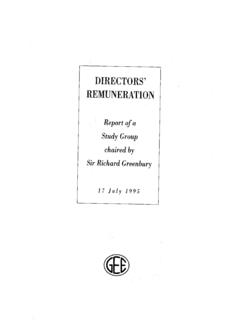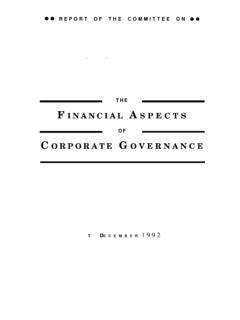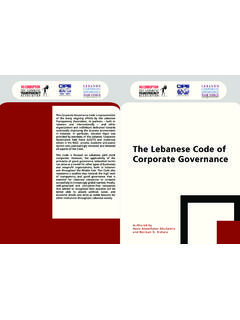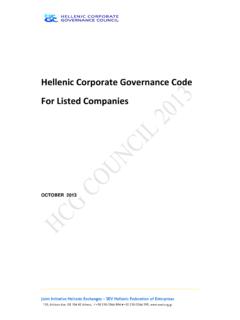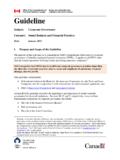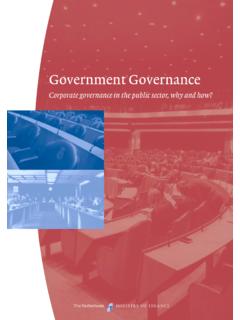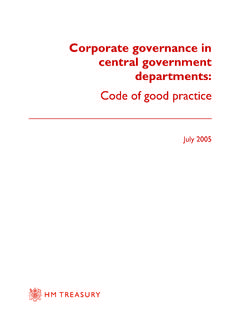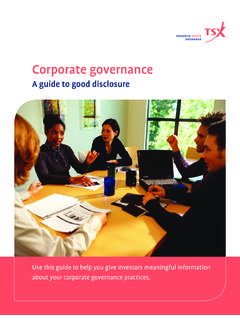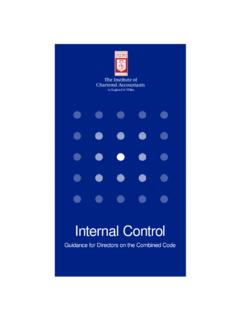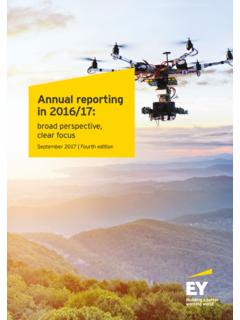Transcription of THE COMBINED CODE ON CORPORATE GOVERNANCE
1 THE COMBINED code ON CORPORATE GOVERNANCEFINANCIALREPORTINGCOUNCILHOLBO RNHALL100 GRAY SINNROADLONDONWC1X 8 ALTELEPHONE020 7611 9700 13/10/2005 13:49 Page 1 Financial Reporting Council 2003 ISBN1 84140 406 3 Electronic copies of this volume and related material are available on theFRC website: copies may be ordered from CCH Information, tel 0870 777 2906or ordered online at: 13/10/2005 13:49 Page 2 THE COMBINED code ONCORPORATE GOVERNANCEJuly 13/10/05 1:44 pm Page 13/10/05 1:44 pm Page 2 CONTENTSP agesThe COMBINED code on CORPORATE GovernancePreamble1-3 Section 1 COMPANIES4-19A Directors4-11B Remuneration12-14C Accountability and Audit15-17D Relations with Shareholders 18-19 Section 2 INSTITUTIONAL SHAREHOLDERS19-20E Institutional Shareholders19-20 Schedule A Provisions on the design of performance relatedremuneration21 Schedule B Guidance on liability of non-executive directors.
2 Care, skill and diligence22 Schedule C Disclosure of CORPORATE GOVERNANCE arrangements23-24 Related Guidance and Good Practice SuggestionsGuidance on internal control (The Turnbull Guidance) 27-42 Guidance on audit committees (The Smith Guidance)43-59 Suggestions for good practice from the Higgs report61-81 Guidance on the role of the chairman63-64 Guidance on the role of non-executive director65-66 Summary of the principal duties of the remuneration committee67-68 Summary of the principal duties of the nominationcommittee69-70 Pre-appointment due diligence checklist for new board members71-72 Sample letter of non-executive director appointment73-76 Induction checklist 77-78 Performance evaluation checklist79-81 Useful Web 13/10/05 1:44 pm Page 13/10/05 1:44 pm Page 4 code ON CORPORATE GOVERNANCEPREAMBLE1. This code supersedes and replaces the COMBINED code issued by theHampel Committee on CORPORATE GOVERNANCE in June 1998.
3 It derivesfrom a review of the role and effectiveness of non-executive directors byDerek Higgs1and a review of audit committees2by a group led by SirRobert The Financial Services Authority has said that it will replace the 1998 code that is annexed to the Listing Rules with the revised code and willseek to make consequential Rule changes. There will be consultation onthe necessary Rule changes but not further consultation on the Codeprovisions themselves. 3. It is intended that the new code will apply for reporting years beginning onor after 1 November 2003. code contains main and supporting principles and provisions. Theexisting Listing Rules require listed companies to make a disclosurestatement in two parts in relation to the code . In the first part of thestatement, the company has to report on how it applies the principles inthe code . In future this will need to cover both main and supportingprinciples.
4 The form and content of this part of the statement are notprescribed, the intention being that companies should have a free hand toexplain their GOVERNANCE policies in the light of the principles, includingany special circumstances applying to them which have led to a particularapproach. In the second part of the statement the company has either toconfirm that it complies with the code s provisions or where it does not to provide an explanation. This comply or explain approach has beenin operation for over ten years and the flexibility it offers has been widelywelcomed both by company boards and by investors. It is forshareholders and others to evaluate the company s statement5. While it is expected that listed companies will comply with the code sprovisions most of the time, it is recognised that departure from theprovisions of the code may be justified in particular circumstances.
5 Everycompany must review each provision carefully and give a consideredexplanation if it departs from the code Review of the role and effectiveness of non-executive directors , published January Audit Committees COMBINED code Guidance , published January 13/10/05 1:44 pm Page listed companies, in particular those new to listing, may judge thatsome of the provisions are disproportionate or less relevant in their of the provisions do not apply to companies below FTSE 350. Suchcompanies may nonetheless consider that it would be appropriate toadopt the approach in the code and they are encouraged to consider companies typically have a different board structure, whichmay affect the relevance of particular Whilst recognising that directors are appointed by shareholders who arethe owners of companies, it is important that those concerned with theevaluation of GOVERNANCE should do so with common sense in order topromote partnership and trust, based on mutual understanding.
6 Theyshould pay due regard to companies individual circumstances and bearin mind in particular the size and complexity of the company and thenature of the risks and challenges it faces. Whilst shareholders haveevery right to challenge companies explanations if they are unconvincing,they should not be evaluated in a mechanistic way and departures fromthe code should not be automatically treated as breaches. Institutionalshareholders and their agents should be careful to respond to thestatements from companies in a manner that supports the comply orexplain principle. As the principles in Section 2 make clear, institutionalshareholders should carefully consider explanations given for departurefrom the code and make reasoned judgements in each case. They shouldput their views to the company and be prepared to enter a dialogue if theydo not accept the company s position.
7 Institutional shareholders should beprepared to put such views in writing where appropriate. 8. Nothing in this code should be taken to override the general requirementsof law to treat shareholders equally in access to publication includes guidance on how to comply with particular partsof the code : first, Internal Control: Revised Guidance for Directors on theCombined code 3, which relates to code provisions on internal control( and part of in the code ); and, second, Audit Committees: COMBINED code Guidance , produced by the Smith Group, which relatesto the provisions on audit committees and auditors ( of the code ). Inboth cases, the guidance suggests ways of applying the relevant Codeprinciples and of complying with the relevant code addition, this volume also includes suggestions for good practice fromthe Higgs 2003 The COMBINED Code23 Internal Control: Revised Guidance for Directors on the COMBINED code , published by the FinancialReporting Council in October 13/10/05 1:44 pm Page revised code does not include material in the previous code on thedisclosure of directors remuneration .
8 This is because The Directors' remuneration Report Regulations 2002 4are now in force and supersedethe earlier code provisions. These require the directors of a company toprepare a remuneration report. It is important that this report is clear,transparent and understandable to 2003 The COMBINED Code4 The Directors' remuneration Report Regulations 2002, 13/10/05 1:44 pm Page 3 code OF BEST PRACTICESECTION 1 BoardMain PrincipleEvery company should be headed by an effective board, which iscollectively responsible for the success of the PrinciplesThe board s role is to provide entrepreneurial leadership of the companywithin a framework of prudent and effective controls which enables risk tobe assessed and managed. The board should set the company s strategicaims, ensure that the necessary financial and human resources are inplace for the company to meet its objectives and review managementperformance.
9 The board should set the company s values and standardsand ensure that its obligations to its shareholders and others areunderstood and directors must take decisions objectively in the interests of part of their role as members of a unitary board, non-executivedirectors should constructively challenge and help develop proposals onstrategy. Non-executive directors should scrutinise the performance ofmanagement in meeting agreed goals and objectives and monitor thereporting of performance. They should satisfy themselves on the integrityof financial information and that financial controls and systems of riskmanagement are robust and defensible. They are responsible fordetermining appropriate levels of remuneration of executive directors andhave a prime role in appointing, and where necessary removing,executive directors, and in succession 13/10/05 1:44 pm Page 4 code The board should meet sufficiently regularly to discharge its dutieseffectively.
10 There should be a formal schedule of matters specificallyreserved for its decision. The annual report should include a statement ofhow the board operates, including a high level statement of which typesof decisions are to be taken by the board and which are to be delegatedto management. The annual report should identify the chairman, the deputy chairman(where there is one), the chief executive, the senior independent directorand the chairmen and members of the nomination, audit andremuneration committees. It should also set out the number of meetingsof the board and those committees and individual attendance by The chairman should hold meetings with the non-executive directorswithout the executives present. Led by the senior independent director,the non-executive directors should meet without the chairman present atleast annually to appraise the chairman s performance (as described ) and on such other occasions as are deemed appropriate.
